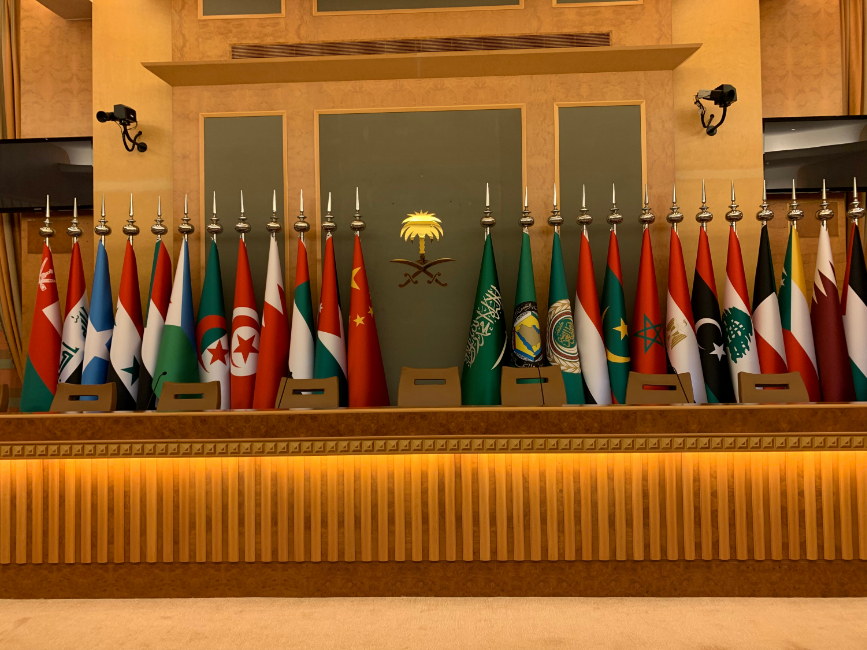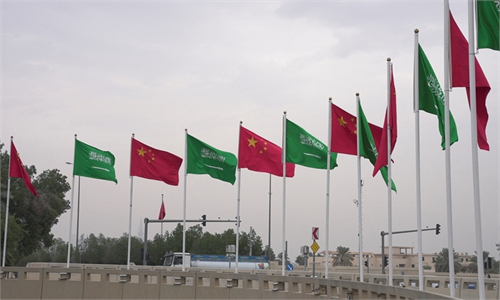
Press conference room for the China-Arab States Summit at King Abdul Aziz International Conference Center on Friday in Riyadh. Photo: Xing Xiaojing and Yu Jincui in Riyadh
The first ever China-Arab States Summit held in Saudi Arabia is both timely and necessary for both parties. Because of its timing and the current fluid state of the regional and global order, it is believed the summit will constitute the most important dialogue in the history of China-Arab relations to date. The summit is expected to help shape the direction of Arab-China relations for at least the thirty years. The current transition period in the world history presents opportunities and risks to both sides. Therefore, discussing and establishing common understanding on the ways to address future prospects and challenges will help both sides to achieve their strategic objectives.
The Arabs are naturally diversifying their strategic partners; China's meteoric rise has offered them with abundant opportunities for strategic partnerships in many areas. The Arabs have regained their self-confidence and are now gradually resolving major regional conflicts in countries such as Libya, Syria and Yemen. The Arabs view China's global development and security initiatives as positive contributions to stabilizing and improving the world system.
Also, the Arabs see China's five-point initiative on achieving security and stability in the Middle East, raised in March 2021, as a good example of China's efforts to contribute to regional security. Regional observers increasingly believe that China can add a positive impetus and bring balance to regional stability and security. The summit is a perfect opportunity to add meat to all those initiatives by discussing and agreeing upon concrete steps to take them forward.
The long discussed and awaited Free Trade Agreement (FTA) as well as trade in general are expected to be among the top agenda items for the highly anticipated Arab-China summit. Additionally, the Arabs see many mutual benefits in joining trade and security groupings such as Regional Comprehensive Economic Partnership (RCEP), BRICS and the Shanghai Cooperation Organization (SCO); the Arabs are interested in furthering their discussions with their Chinese partners about the possibility of joining these multilateral organizations. China is a key member in all those multilateral arrangements and its support will be essential in enabling Arab nations to gain memberships.
The core component of Arab-China relations is energy. Arab nations are among China's largest oil and gas suppliers; on the other hand, China is among Arabs' largest oil and gas importers. The energy partnership will only grow further.
Both of the Arabs and Chinese are acutely aware of the tectonic changes the world system is currently experiencing. Both sides have been trying to influence the shape of the new emerging world order and both are committed to multipolarity. Both sides are eager to solidify their bilateral and multilateral relations, and are working to broaden and deepen their ties across a wide range of sectors from economics and trade to technology and science.
US media outlets are hyping that China is taking advantage of US row with Saudi Arabia and other Middle East countries to expand influence in the region. This is not true. Arab-China relations are deeply rooted in history and win-win synergies. Mutual trust and respect between the two sides is rapidly growing, driven by similarity in their worldviews and future visions. The leaders of both sides are eager to take their relations to new heights.
The exponentially strengthening relations between Arab countries and China are too strategic to be influenced by any third party. The Arabs have made a strategic decision that their future security and prosperity will not be beholden to one single country or one single bloc of countries. This is why the Arab countries have openly and publicly declared their neutrality in the rapidly intensifying great power rivalry.
The Arabs take themselves and their foreign relations too seriously to pay attention to how politicians in third countries view Arab relations with China. The world of today is not the same as that of the 1990s or early 2000s; the world of today is rapidly democratizing and multipolarizing. No one single country or one single bloc of countries can dictate how the global system should be structured or function; the Arabs and Chinese are highly aware of this fact, and they structure their foreign relations accordingly.
The article is complied by Global Times reporters Yu Jincui and Xing Xiaojing in Riyadh based on an interview with Ebrahim Hashem, a UAE strategist and former adviser to the chairman of the Abu Dhabi Executive Office, an authority responsible for Abu Dhabi's long-term strategies. opinion@globaltimes.com.cn

